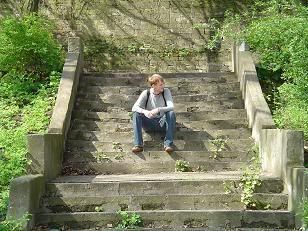 |
| Central monument, with obelisk and eternal flame. |
This (picture at left) is the central area of the main memorial to the battle. I say main memorial because it is only one of many memorials and other markers in the city, most of which are quintessential late Soviet-era monuments. The battle is a big deal to the city, and rightly so.
One historical explanation of the tide of the war suggests that if Moscow was decisive in the winter of 1941 in stopping the German advance, then Stalingrad in the winter of 1942-43 turned the tide, and Kursk was the last gasp of the Wehrmacht as an offensive fighting force. Once the Red Army's defense of Kursk broke the German attack, its counter-attack left open the long and bloody road to Berlin.
It is interesting how Soviet monuments are evolving in post-Soviet Russia. I'm not a betting man, but I would put the farm on a wager that this Orthodox angel was not on the obelisk when it was erected in the Soviet period. At the same time, Kursk has changed in this respect less than many places in the country I've visited. The hammer and sickle are not hard to come by anywhere, but the topography of Kursk proudly displays "Karl Marx St." and "Lenin St." in addition to a myriad of toponyms honoring heroes of the battle.
 |
| Detail of the obelisk. |
They were thrilled that an American was interested in the Khrushchev period, and in Khrushchev: his native village is in the Kursk region and I was reminded a couple of times of the fact. "Хрущев? Он - наш." "He's one of ours."

2 comments:
Hi Aaron,
Very interesting...thanks. B Lett
I'm glad you're enjoying it! Hope all is well!
Post a Comment